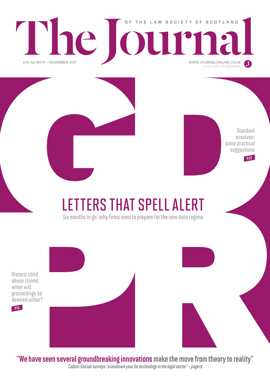Sorry; not sorry

In a society which appears to have adopted a culture of “where there’s blame… there’s a claim”, have we developed a fear of apologising?
That seems to have been the driving force behind the Apologies (Scotland) Act 2016, which was introduced with the intention of encouraging a cultural and social change in attitudes towards apologising.
But how does the Act interact with contractual obligations in insurance policies, and should we still be wary of making an apology?
The Act
The Act’s key provisions came into force on 19 June 2017 and give legal protection to an apology in most civil proceedings by preventing the apology being used as evidence of liability.
Section 1 of the Act provides that, in certain civil proceedings (defined in s 2) an apology is:
(a) not admissible as evidence of anything relevant to the determination of liability; and
(b) cannot be used in any other way to the prejudice of the person by or on behalf of whom the apology was made.
The Act defines an apology as: “any statement made by or on behalf of a person which indicates that the person is sorry about, or regrets, an act, omission or outcome and includes any part of the statement which contains an undertaking to look at the circumstances giving rise to the act, omission or outcome with a view to preventing a recurrence”.
As legal professionals, in a client-facing industry, it is possible to envisage situations where an apology might assist to resolve a dispute before a complaint or claim arises. In the context of claims arising from workplace accidents or employment disputes, a genuine and candid apology could be enough to stop the litigation ball rolling.
The protection afforded by the Act may also be of benefit to parties in circumstances in which claims have already arisen. We have all experienced situations where the sticking point in resolving a claim is one party’s desire to receive an apology. Without the fear of an apology being taken as an admission of guilt or wrongdoing in the context of a court action, an apology could defuse an otherwise toxic dispute.
But a word of caution...
While it is never too late to say sorry, at what point does an apology become an admission?
The Oxford Dictionary’s definition of an apology is “a regretful acknowledgement of an offence or failure”. The explanatory notes to the Act make it clear that the protections afforded to apologies do not extend to statements of fact or admissions of fault: if a statement includes both an apology and a statement of fact and/or admission of fault, only the apology is inadmissible as evidence of liability.
Is there a distinction to be made between an “acknowledgement of a failure” and an “admission of fault”?
The Act also informs us that an apology may include an undertaking to review circumstances giving rise to an incident. There are circumstances where an “undertaking to review” might be seen to imply an admission or acknowledgment of fault. At what point do we risk stumbling into the realm of admissions?
Most insurance policies prohibit insureds from making unauthorised admissions of liability. As solicitors, does the Act now enable us to apologise to disgruntled clients without fear of repercussions?
General condition 2 of the Master Policy states: “No admission, offer, promise, payment or indemnity shall be made or given by or on behalf of the insured without the written consent of the insurers.”
Could an apology amount to “an admission, offer or promise”? Until we see how the Act is applied in practice the answer is not clear. Firms seeking indemnity under the Master Policy (and those acting for insurer and insured clients), must to bear in mind the contractual terms of the policy before launching into a full scale apology. An apology may seem to be the most effective way to try to neutralise a client complaint before a claim is made, but we may be walking a fine line between an apology and an admission.
The key to staying on the right side of the insurance policy is making sure any apology is made with the consent of the insurers.
For what it’s worth – what does this all mean?
It is yet to be seen how the Act will be applied in practice.
We should not underestimate the potential benefits of an apology, but we should be wary of falling into the trap of an apology being taken as an admission of liability.
So while sorry may no longer be the hardest word… do it with the approval of the insurers, or… you may be sorry.
This article expresses the views of the authors and does not necessarily represent the views of the Master Policy insurers.
In this issue
- Immigration detention: a case of overuse
- Sexual harassment: don't suffer in silence
- Child disputes: a quicker way through?
- Brexit: where are we now and what happens next?
- Reading for pleasure
- Opinion: Claire McKee
- Book reviews
- Profile
- President's column
- ScotLIS: the citizens' tool
- People on the move
- People matter
- Historic abuse: the fairness matrix
- Landmark year in legal IT
- Sentence, but no full stop
- Opening up arbitration
- Making the agent pay
- Equal pay: beware the mass claims
- Dealing with conflict
- Claims outside the rules
- Pension transfers – history repeating itself?
- Last instructions
- Scottish Solicitors' Discipline Tribunal
- Standard missives: an unachievable dream?
- SOLAR powered
- Disability rights
- Law reform roundup
- Too hard a drive?
- Settlement: can you avoid cheques?
- Q & A corner
- When 25 is the new 35
- Sorry; not sorry
- Ask Ash
- Plan sets ambitious 2017-18 targets
- Letting agents: prepare to register
- Paralegal pointers
- A way to make an impact






